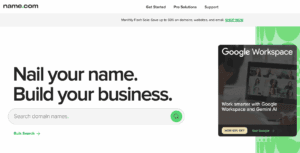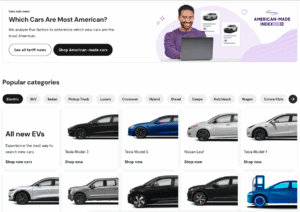The Best Places to Buy and Sell Domain Names
Looking for some tried and tested places to buy or sell everyday domain names? Here’s our expert guide. 1. Atom.com (formerly Squad Help) Curated Selection of brandable and premium domains. Quality Assurance: Each premium domain is carefully reviewed by branding experts to ensure it meets high standards of originality, pronunciation, and memorability when selling domain names. Business Identity Professional Logo Designs: Top designs for your org and branding strategy. Visual Identity Package: Every premium domain listing includes a professionally designed logo for your org, providing a cohesive domain brand package for your business resources and company’s identity. User-Friendly Search and Navigation Advanced Filtering: Search domains by industry, point, style, length, and other attributes to find the perfect match. 2. Sedo Sedo is a dedicated domain marketplace (similar to GoDaddy) with millions of users. It has been around for over two decades, making it a trusted marketplace for buying and selling domains. Any domain name owner can sign up for free and list their domain for sale on the website, and prospective buyers can easily contact them through the platform to buy domains. On Sedo, sellers can set a fixed price for their domain, put it up for auction, or indicate that they’re entertaining offers with an unspecified price range. When buyers come to the site, they can search for any keyword and check if anyone has listed a related domain name on the market. Sedo Search Sample: The first three results are bikes.org, bikes.co, and bikes.biz, which are premium domain names. Sedo also includes other domain names that are closely related to your search phrase to sell domains. The first two domains in this example have a Make Offer buttons next to them, while the last has a Buy It Now button for your popular domain. This indicates that the domain sellers of the first two domains put them up for auction, while the third domain’s owner set a fixed price for their marketing strategy. As a buyer, you’re free to search for any specific URL and find related domains listed on Sedo to find the perfect domain. Purchasing from the domain marketplace requires added registration and jumping through a few other hoops, but it’s worth it, as Sedo has such a large selection of premium domains available for acquisition. Search for domains on Sedo: Sedo Domain Marketplace 3. NamePros NamePros is an online community for domain name owners to interact and discuss events related to their industry. In the forum’s early days, users commonly posted they had domain names available for sale and wanted to connect with potential buyers. Observing this, the owner of the forum launched an official domain marketplace section for buying and selling domain names. On NamePros, any registered user can list the domain names they have available in a forum post. To make the domains easy for prospective buyers to find, NamePros has formal categories that users can attach to their posts to find the perfect domain. How much is it worth? Namepros can also share pertinent details of recently sold domains that are similar in nature to your domain search. Because it is a forum, NamePros only helps buyers and owners find each other, and it’s up to them to negotiate and decide how they’ll handle payments for the domain. This is unlike Sedo, which facilitates payments and domain transfers for its users, among other services. When using NamePros to buy a domain you should be more careful about your purchase. Set specific terms with the seller before proceeding on any deal, and use a trusted online escrow service (e.g. Escrow.com) to ensure that the payment goes through only after the seller has transferred the domain name to your preferred registrar. You can find a large variety of domain names for sale on NamePros, making it one of the best domain marketplaces in the World. Search for domains on NamePros: NamePros Domain Marketplace






